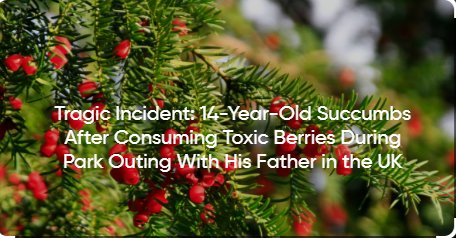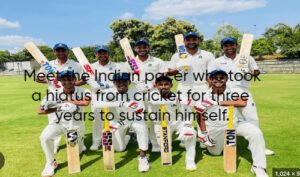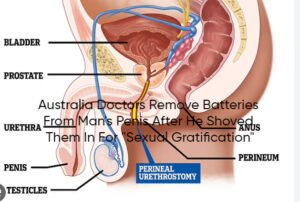Tragic Incident: 14-Year-Old Succumbs After Consuming Toxic Berries During Park Outing With His Father in the UK

The adolescent allegedly ingested berries and leaves from a yew tree, unaware of their toxicity, a fact unknown to both him and his father.
This is indeed a tragic incident, and the loss of a young life is always heartbreaking. The details of the case highlight the potential dangers associated with certain natural elements, in this case, the yew tree, which may not be widely known to the public.

On September 18 of the preceding year, Benn, accompanied by his father, took a stroll in the park. By 6 pm that day, the teenager began feeling unwell and suddenly collapsed. Emergency services swiftly transported him to the Royal Manchester Children’s Hospital via ambulance. Tragically, he passed away in the early hours of September 19, 2022.
The decision by authorities not to issue a public alert has raised concerns, with the coroner emphasizing the need for reconsideration. The rationale provided by the UK Health Security Agency (UKHSA) about the potential harm of issuing an alert is a complex aspect, considering the delicate balance between raising awareness and avoiding unintended consequences. The concern about potential self-harm or suicide stemming from such communications adds a layer of complexity to public health messaging.

It is clear from the coroner’s report that there is a need for better education and awareness regarding the risks associated with certain plants, especially for vulnerable individuals like young children. The call for proactive measures and additional deliberation is a reasonable response to prevent similar incidents in the future.
After thorough deliberation, the council and the UK Health Security Agency (UKHSA) chose not to issue an alert, expressing reservations that such a warning might potentially pose a higher risk of harm than offering benefits. This decision was based on the consideration that deaths from yew tree poisoning are relatively infrequent.

An email correspondence from UK Health Security Agency (UKHSA) to the council stated, “We concurred that, currently, there might be a risk of causing more harm than good with any communications disseminated.
The commitment from both Manchester City Council and UKHSA to consider and respond to the coroner’s recommendations is crucial for improving public safety. It highlights the importance of ongoing collaboration between authorities and health agencies to address such incidents and enhance preventive measures.
However, the coroner characterized the decision as “illogical.”

“Berries and similar items could be enticing to young children, who may not grasp the potential hazards and risks, including the possibility of illness or even death,” he wrote in his report aimed at preventing future deaths. “The toxic nature of the yew tree doesn’t seem to be widely recognized by the public based on the available evidence.
“The decision seems to center solely on communications regarding the yew tree and the associated risks, neglecting to address the possibility of identifying alternative methods of intentional ingestion for suicide.”

“There was no apparent effort to emphasize the dangers of consuming wild berries and/or leaves in more general terms.”
“In this situation, I believe that the choice to refrain from issuing public health messages, whether specifically related to the yew tree or in broader terms, was not adequately considered and thoroughly examined. It warrants reconsideration.”

Mr. Bridgman concluded that there is a potential for a fatality under similar circumstances, and disseminating information to the public about the dangers of yew trees would help mitigate this risk.
“I believe that proactive measures, specifically additional consideration, should be implemented to prevent future deaths, and I trust that you have the authority to enact such measures,” he stated.
A spokesperson for Manchester City Council expressed, “Our condolences go out to the family in this tragic case. We are treating this matter with the utmost gravity, and we will consistently seek guidance on best practices, responding to the coroner’s recommendations in due course.”

Ultimately, tragedies like this underscore the importance of public awareness, education, and communication to ensure the safety of individuals, particularly when it comes to potential hazards in natural environments.




